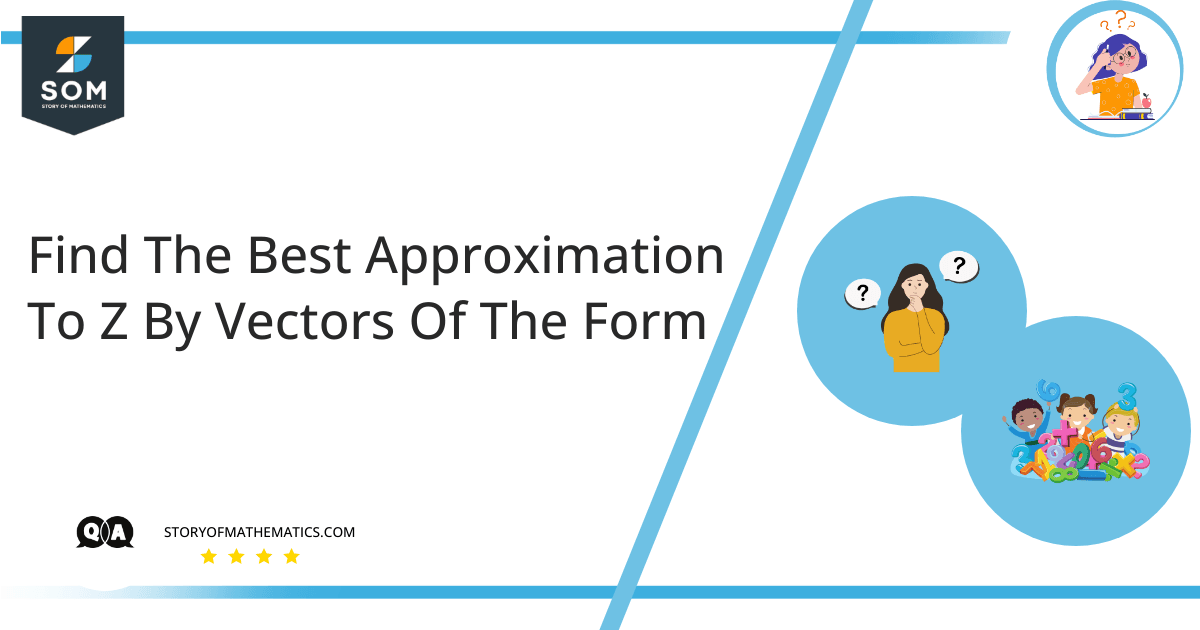
This problem aims to find the best approximation to a vector $z$ by a given combination of vectors as $c_1v_1 + c_2v_2$, which is same as the vectors $v_1$ and $v_2$ in span. For this problem, you should know about the best approximation theory, fixed point approximation, and orthogonal projections.
We can define fixed-point theory as an outcome stating that a function $F$ will have at most one fixed point that is a point $x$ for which $F(x) = x$, under some circumstances on $F$ that can be said in known words. Some writers reason that outcomes of this type are amongst the most commonly valuable in mathematics.
Expert Answer
In high-end mathematics, the best approximation theory is related to how complicated functions can efficiently be related to simpler functions, and quantitatively represent the errors raised thereby. One thing to note here is that what is represented as the best and easiest will rely on the problem being introduced.
Here, we have a vector $z$ that spans over the vectors $v_1$ and $v_2$:
\[z = \left [\begin {matrix} 2\\4\\0\\-1\\ \end {matrix} \right] v_1 = \left [ \begin {matrix} 2\\0\\-1\\-3\\ \end {matrix} \right] v_2 = \left [ \begin {matrix} 5\\-2\\4\\2\\ \end {matrix} \right ]\]
We are going to find the unit vector $ \hat{z} $ by using the formula:
\[\hat{z} = \left( \dfrac{z.v_1} {v_1.v_1} \right) v_1 + \left( \dfrac{z.v_2}{v_2.v_2} \right) v_2\]
Where $c_1$ and $c_2$ are given as:
\[c_1 =\dfrac {z.v_1} {v_1.v_1}\]
\[c_2 = \dfrac{z.v_2} {v_2.v_2}\]
We can find the rest of the combinations as simple dot products:
\[v_1.v_2 = (2)(5) + (0)(-2) + (-1)(4) + (-3)(2)=0, v_1 \perp v_2\]
\[z.v_1 = (2)(2) + (4)(0) + (0)(-1) + (-1)(-3) =7\]
\[z.v_2 = (2)(5) + (4)(-2) + (0)(4) + (-1)(2) =0\]
\[v_1.v_1 = (2)(2) + (0)(0) + (-1)(-1) + (-3)(-3) =14\]
\[v_2.v_2 = (5)(5) + (-2)(-2) + (4)(4) + (2)(2) =34\]
Now, plugging these values in $c_1$ and $c_2$:
\[ c_1 = \dfrac{v_1.z} {v_1.v_1}=\dfrac{7} {14} \]
\[ c_1 =\dfrac{1}{2}\]
\[ c_2 = \dfrac{z.v_2} {v_2.v_2} =\dfrac{0}{34} = 0 \]
\[ c_2 =0\]
Numerical Result
\[ \hat{z} =\dfrac{z.v_1}{v_1.v_1}v_1 + \dfrac{z.v_2}{v_2.v_2}v_2 = \dfrac{1}{2}v_1+0v_2\]
\[= \dfrac{1}{2} \left [\begin {matrix}2\\0\\-1\\-3\\ \end {matrix}\right]\]
This is the best approximation to $z$ by the given vectors:
\[\hat{z} = \left [\begin {matrix}1/2\\0\\-1/2\\-3/2\\ \end {matrix}\right]\]
Example
Estimate the best approximation to $z$ by the vectors of the form $c_1v_1 + c_2v_2$.
\[z = \left [\begin {matrix}3\\-7\\2\\3\\ \end {matrix}\right] v_1 = \left [ \begin {matrix}2\\-1\\-3\\1\\ \end {matrix}\right] v_2 = \left [ \begin {matrix}1\\1\\0\\-1\\ \end {matrix} \right ]\]
Finding $c_1$ and $c_2$:
\[c_1 = \dfrac{v_1.z}{v_1.v_1}= \dfrac{10}{15}\]
\[c_2 = \dfrac{z.v_2}{v_2.v_2} = \dfrac{-7}{3}\]
\[\hat{z} = \dfrac{2}{3} \left [ \begin {matrix}2\\-1\\-3\\1\\ \end {matrix}\right] + \dfrac{-7}{3} \left [ \begin {matrix}1\\1\\0\\-1\\ \end {matrix} \right ] = \left [ \begin {matrix}-1\\-3\\-2\\3\\ \end {matrix} \right ] \]
